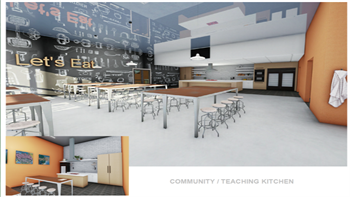The South Side is getting a facility to turn food waste into natural gas
Corli Jay, Reprinted from Crain's Chicago Business, May 19, 2022 01:26 PM
Published: May 19, 2022

A new renewable natural gas project is underway in Auburn Gresham on the Green Era Campus. Renewable natural gas, also known as RNG
or “trash gas,” is a synthetic gas equivalent to natural gas that uses waste from landfills that emit methane an energy source. The South Side campus is a nine-acre renewable energy facility located at 650 W. 83rd St.
The campus, which is spearheaded by Green Era Educational NFP— incubated by Growing Power Chicago—is being used to provide solutions that address complex issues of unemployment by creating more than 300 jobs, mostly for formerly incarcerated residents; food insecurity by growing a variety of fruits, vegetables and herbs in one of the most food-insecure neighborhoods in Chicago; and landfill overflow by diverting unconsumed processed foods, 40% of which is never consumed in the U.S., from landfills into renewable energy.
The campus will also house a community education center, retail store and nursery—an urban farm and greenhouse that will be operated by the nonprofit Urban Growers Collective.
“We're recycling here. We're creating some renewable energy. We’re creating nutrient rich soil to grow local food. With the educational campus we're going to be doing workforce development and job training,” said Jason Feldman, a co-founder of Green Era.
A main component of the project is its anaerobic food digester that will use food waste to produce RNG, which is said to be the first of its kind in the Midwest. The campus would include two 1.7 million-gallon anaerobic digesters. The digesters produce renewable energy by converting organic biodegradable materials into RNG; Green Era will also convert similar waste that is ordinarily sent to landfills into renewable natural gas.
Green Era is looking to interconnect with Peoples Gas for the project to have access to their distribution system. Peoples Gas recently filed a petition asking the Illinois Commerce Commission to expedite the project no later than June 30. The interconnection agreement delineates responsibilities associated with the construction, ownership and management of the RNG project to the Peoples Gas distribution system.
The total cost of the project interconnection is projected to be $1.7 million, with Peoples Gas aiming for the cost to be offset by ratepayers.
Recently, Nicor Gas announced a pilot program to use RNG to heat the homes of suburban Chicago; the company filed with the ICC last year to launch the pilot. The move was opposed by some environmental groups who say the long-term future of RNG as a primary source of heat is questionable and the cost could be much higher than traditional gas. The project was later approved in July.
Erika Allen, co-founder and CEO of Urban Growers and president of operations for Green Era Educational NFP, stresses the difference between this RNG project and others like the one proposed by Nicor that puts their digesters on landfills that are producing too much methane.
“Our project is very different from a Nicor or kind of traditional digesters at a dairy operation or bio digesters that are part of municipal sewage operators, all using the same kinds of technology. Ours is specifically to divert food waste from going into landfills, so that we can compost that material, capture the methane so nothing is released when it's put in a landfill,” said Allen.
Allen mentioned that the digester also generates more compost for Urban Growers to be able to grow food, mentioning the need for these materials in an urban setting. “There's no reason to be using landfill space that really needs to be utilized for things that can't be disposed of in any other way," she said. "We should be recirculating those natural resources.”
Skepticism from residents came early when they began talking about the project 10 years ago. Allen said she understood the pushback as projects that usually come into South and West Side communities have promised one thing but led to another.
“There was some political kind of rhetoric where people were being told that we're going to be a sewage plant and we're going to be creating all these toxic chemicals and shouldn't be in our community. And we were like, no, this is the absolute opposite of what we're doing. We're cleaning up a brownfield.”
Allen said that some of the environmentalists, who want to see less large-scale feedlots and methane production are not necessarily against their project, but that they’re all lumped together.
“I do think it's important to talk about agriculture-based projects that are taking food waste and creating clean energy. And we're taking the solids that come from the process to grow more food, and we're creating opportunities to expand this kind of integrated operation.”
Laurell Sims, co-founder of Urban Growers, says that they have been working closely with the community to help them better understand the project and attending monthly meetings to educate residents.
“We worked very closely with the Greater Auburn-Gresham Development Corporation and with a couple of different high schools around here, so Simeon being one of them, to really just let people know how this project is different from a lot of corporations that just kind of come in and cause huge environmental disruption,” she said.
Both Simeon Career Academy and Leo High School helped finalize the design and budget for the Community Education Center.
The project has garnered the support of Mayor Lori Lightfoot's office and answers Gov. J.B. Pritzker’s call-to-action for Illinois to quickly implement renewable projects to meet clean energy goals. Along with Pritzker’s approval, the state also helped fund the project with $2 million.
Always Growing, Auburn Gresham, received $10 million from the inaugural Chicago Prize in 2020 for their proposal that included the Green Era Campus.
Keywords:
Auburn Gresham, gagdc, Green Era, renewable energy, RNG, Urban Growers Collective
Posted in Education, Auburn Gresham in the News, Business, Housing, Economic Development, Community Highlights